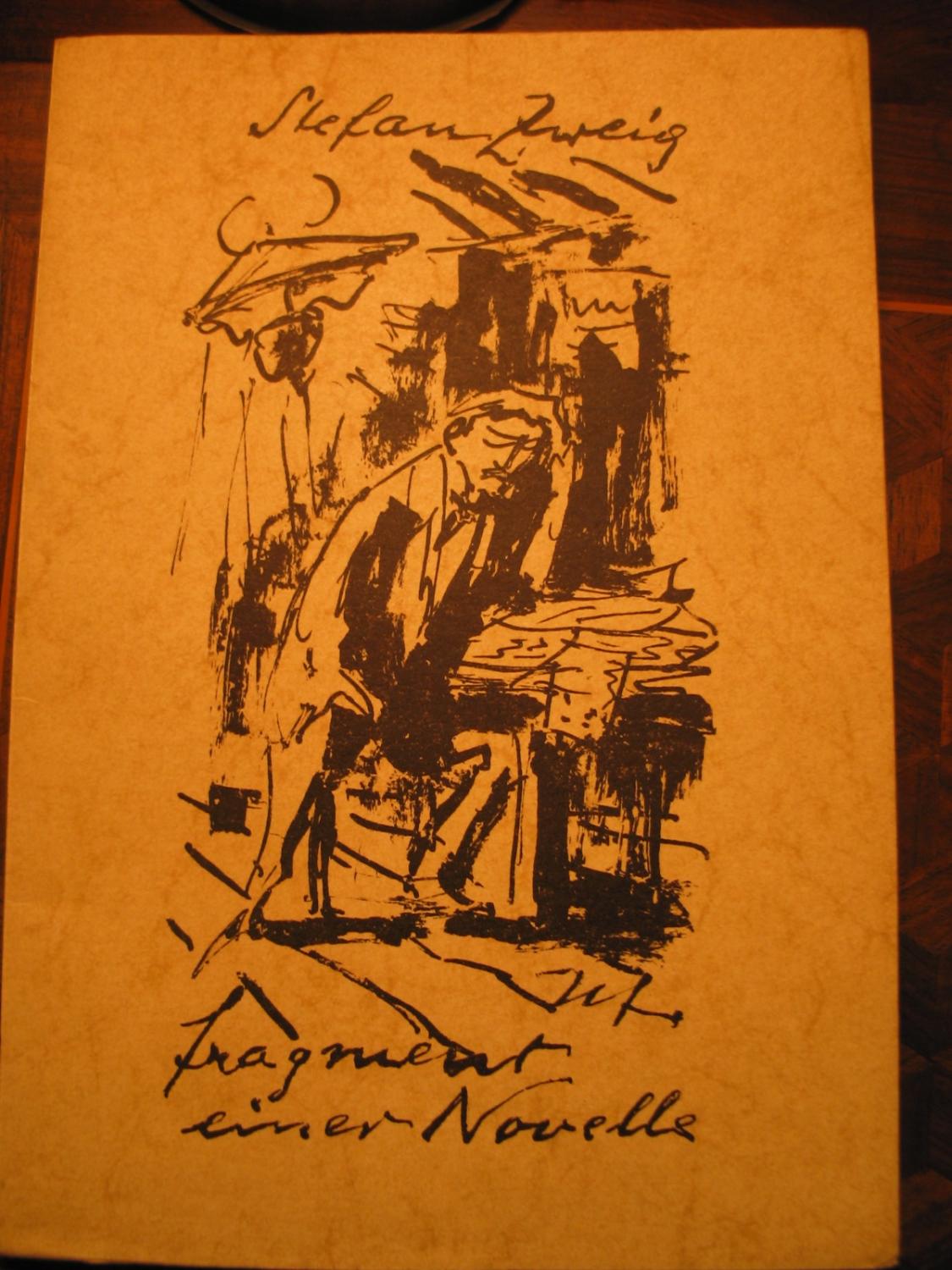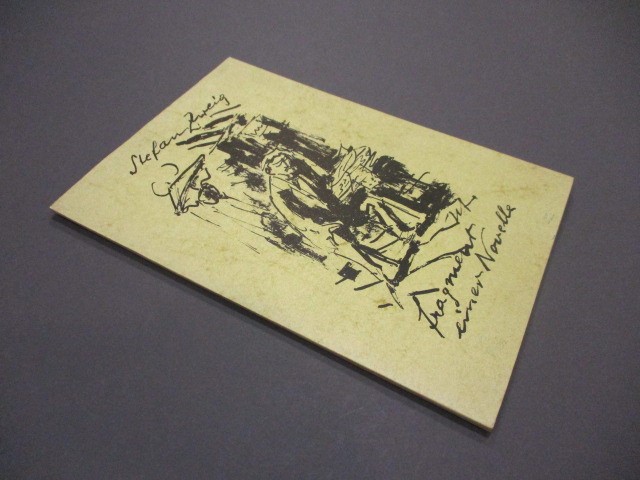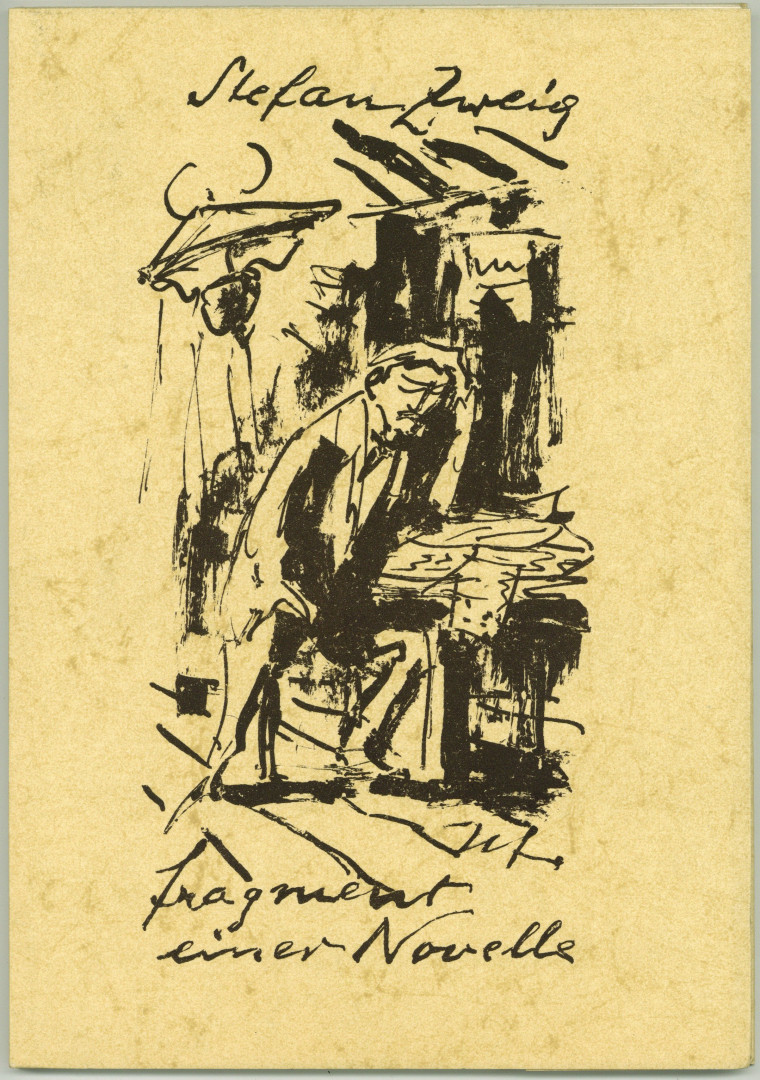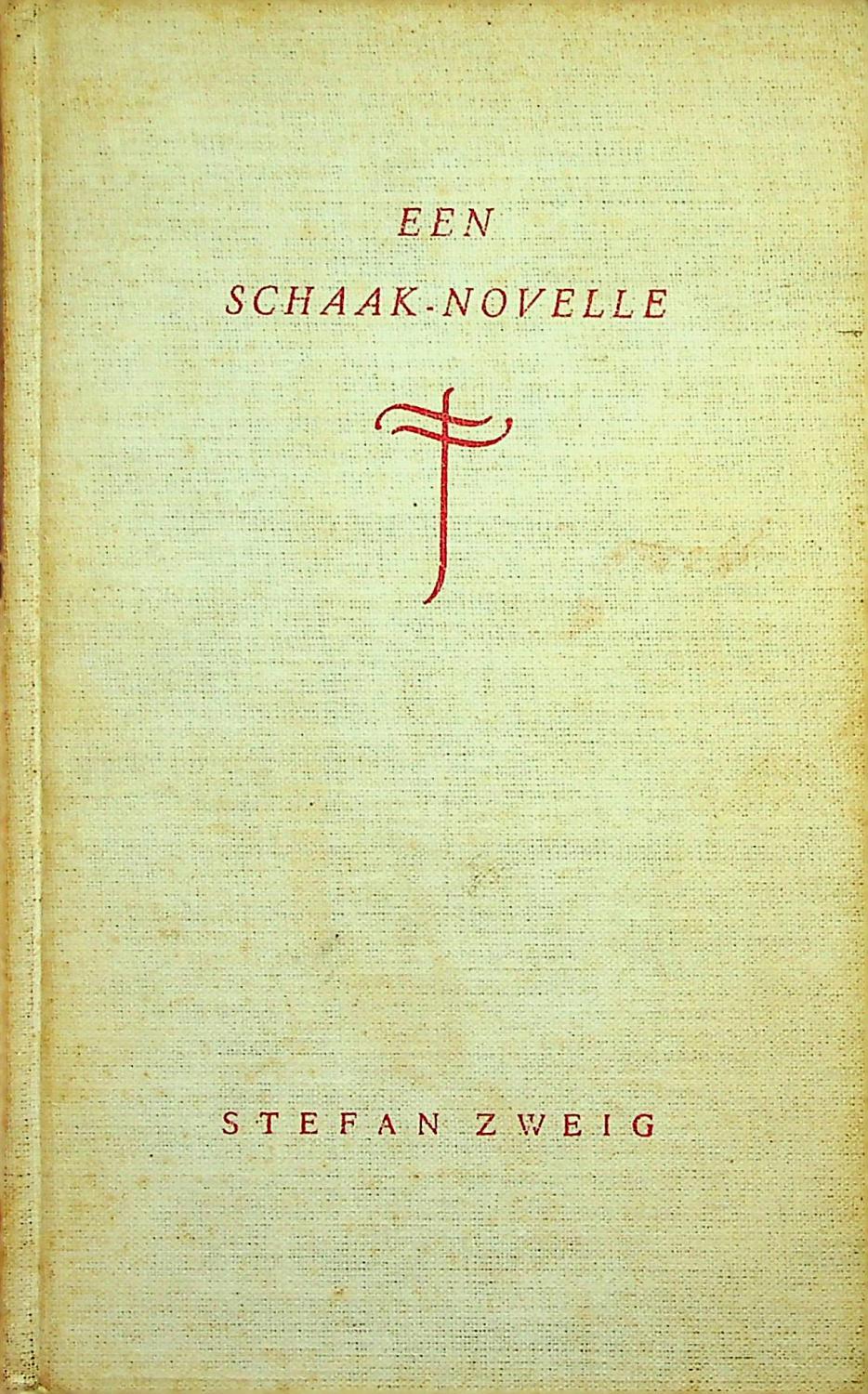Search results 37 Found
Frühlingsfahrt durch die Provence. Ein Essay. Herausgegeben von Erich Fitzbauer.
Frühlingsfahrt durch die Provence. Ein Essay. Herausgegeben von Erich Fitzbauer.
Fronius. - Zweig, Stefan:
- Publisher: Wien, Verlag der Internationalen Stefan-Zweig-Gesellschaft
- Date published: 1965
- Format: Softcover
4 Bll.; 1 Bl. Mit 7 ganzseitigen Original-Lithographien von Hans Fronius. Quer-4°. Obrosch. .enthält Zweigs Prosastück 'Frühlingsfahrt durch die Provence', welches in Buchform nur ein einziges Mal, in dem Bändchen 'Fahrten' . erschienen ist. Die Entstehung fällt in die Zeit vor dem Ersten Weltkrieg. Die Skizzen, auf die die Lithographien von Hans Fronius zurückgehen, entstanden während einer Südfrankreich-Reise im April 1962". - Nr. 58 von 450 num. Exemplaren von Hans Fronius im Impressum signiert. - Umschlag verstaubt und stellenweise bestoÃen, innen gut erhalten. "Fünfte Sonderpublikation der Internationalen Stefan-Zweig-Gesellschaft".
antiquariatandreasmoserinhwklgel-117.24-dcf5b67d1f1457484604d38876242d56
Joseph Fouche

Joseph Fouche
Stefan Zweig; Alzir Hella [trans.]; Olivier Bournac [trans.]
- Publisher: Bernard Grasset
- Date published: 1935
Paris: Bernard Grasset, 1935 . Leather. Near Fine. 8.5" by 6". None. An attractively bound French language translation of Stefan Zweig's biography of enigmatic French statesman Joseph Fouche. Translated from the original German into French by Alzir Hella and Olivier Bournac.In a half morocco signed binding from Brugalla, who bound this work in 1936.The front wrap of the work is bound in, identifying this as the 61st edition.Zweig offers a biography of one of the most enigmatic figures in French history, a master of political survival who navigated the shifts of power during the French Revolution, Napoleon's reign, and the Bourbon Restoration. Zweig portrays him as a cold, calculating man, skilled in manipulation and espionage, who betrayed allies and switched loyalties in the aid of his own survival. In a half morocco signed binding, with marbled paper covered boards. Gilt detailing to back strip, with fading to back strip as is common with blue morocco. Front wrap bound in. Small handling mark to front wrap. Internally, firmly bound. Pages clean and bright. Near Fine
rookebooks-134.22-d4249027c6f1f22d3b701c9e7b49a4b3
Fragment einer Novelle

Fragment einer Novelle
Stefan Zweig
- Publisher: Erich Fitzbauer
- Date published: 1961
- Format: Softcover
. Mit 4 Lithographien von Hans Fronius. (14) Bll. Gr.-8vo. Orig. illus. Brosch. Zweite Sonderpublikation der Internationalen Stefan-Zweig-Gesellschaft". Eines von 500 num. Exemplaren auf Zerkall-Bütten, von Fronius im Kolophon signiert; hier N.109; sehr Gutes Exemplar;
magnus-149.54-e815215993e11af2d4b279ec417d64e7
Fragment einer Novelle. Mit 4 Lithographien von Hans Fronius. Hrsg. von Erich Fitzbauer.

Fragment einer Novelle. Mit 4 Lithographien von Hans Fronius. Hrsg. von Erich Fitzbauer.
Zweig, Stefan:
- Publisher: Wien, Verlag der Internationalen Stefan Zweig Gesellschaft,
- Date published: 1961
- Format: Softcover
10 Bll. 4 Original-Lithographien von Hans Fronius. Nr. 8 von 500 von Hans Fronius signierten Exemplaren. - Die Erstausgabe war 1929 erschienen.- Titel mit einer 5-zeiligen, signierten und datierten Widmung von Hans Fronius. - Leicht gebräunt. *** *** Copyright: Matthaeus TRUPPE Buchhandlung & Antiquariat - Stubenberggasse 7 - A-8010 Graz - ++43 (0)316 - 829552 *** *** Sprache: Deutsch Gewicht in Gramm: 200 Gr.-8°. OKart. (kl. Gebrssprn.).
matthaeustruppeantiquariat-153.60-72ddd9b279746d90484060bf3aedd0d0
Fragment einer Novelle. Mit 4 Lithographien von Hans Fronius. Herausgegeben von Erich Fitzbauer.

Fragment einer Novelle. Mit 4 Lithographien von Hans Fronius. Herausgegeben von Erich Fitzbauer.
Zweig, Stefan:
- Publisher: Wien Verlag der Internationalen Stefan-Zweig-Gesellschaft
- Date published: 1961
- Format: Softcover
* Mit 4 signierten Original-Lithographien von Hans Fronius auf Tafeln. 10 Blatt. 25,5 x 17,5 cm. Illustrierte Original-Broschur. (2. Sonderpublikation der Internationalen Stefan-Zweig-Gesellschaft). Eins von 500 nummerierten Exemplaren. Im Druckvermerk von Hans Fronius signiert. *** Tiessen II, 35. - Erste Einzelausgabe, zuvor lediglich im Sammelband "Das Buch des Gesamtverbandes Schaffender Künstler Ãsterreichs" (1929) erschienen. - Titel mit eigenhändiger Widmung von Hans Fronius. - Schönes durchsigniertes Widmungsexemplar mit beiliegender Danksagungskarte mit eigenhändigen Zeilen.
schsischesauktionshausantiquariat-179.45-4ccfb56f9405423bde887390c9b65457
Frühlingsfahrt durch die Provence. Ein Essay. Herausgegeben von Erich Fitzbauer. (= Fünfte Sonderpublikation der Internationalen Stefan-Zweig-Gesellschaft).
Frühlingsfahrt durch die Provence. Ein Essay. Herausgegeben von Erich Fitzbauer. (= Fünfte Sonderpublikation der Internationalen Stefan-Zweig-Gesellschaft).
[Fronius, Hans]. - Zweig, Stefan.
- Publisher: Wien, Verlag der Internationalen Stefan-Zweig-Gesellschaft, 1965.
- Date published: 1965
- Format: Softcover
Nr. 321 von 450 im Druckvermerk vom Künstler sign. Exemplaren auf Zerkall-Bütten. - Hier alle sieben Lithographien von Fronius eigenhändig signiert. - Umschlagränder tlw. leicht bestoÃen. - Tiessen II, 50. ge Gewicht in Gramm: 2000 Qu.-Fol. Mit 7 sign. Lithographien von Hans Fronius. 5 Bll., OKart. m. OUmschlag.
versandantiquariatwolfgangfriebes-215.34-5999ee62d0146eba3c297b8aefc1deb2
EEN SCHAAKNOVELLE

EEN SCHAAKNOVELLE
Stefan Zweig
- Publisher: Uitgeverij Keesing., Amsterdam
- Date published: 1949
- Format: Hardcover
Signed by the translator dr. Paul Huf, with the text: "Voor mijn gullen gastheer Ad Vroom en zijn charmante vrouw, deez Kleine herinnering aan de zoo inspirerende Kerstvriering met het V&D personeel. Zwolle 1919(22/xII)49, Paul Huf de vertaler en verteller". Ad Vroom wos one of the family members of the founders of Vroom & dreesman (V&D). He had a shop in Zwolle and organised the purchase of toys for the shop.
ofkefke-254.74-3718e3aa408ce46436fc0e27d4fab70a
THE INVISIBLE COLLECTION

THE INVISIBLE COLLECTION
Zweig, Stefan
- Publisher: Ursus Books
- Date published: 2007
New York: Ursus Books, 2007. Frontispiece by Joseph Goldyne. Pp. 16+[2](colophon, verso blank), hand-tipped frontispiece, the publisher's device on title page and a couple of small text decorations printed in light red/brown; tall demy 8vo; black morocco-backed light brown papered boards, spine lettered in gilt, printed paper title label on upper board, top fore-corner of lower board a trifle bruised, book label of David Levine, Sydney, on the upper pastedown; Ursus Books, New York, 2007. One of 50 numbered copies thus, signed by the artist and printer. *Designed and printed by Peter Rutledge Koch with Jonathan Gerken and Jonathan Fetter-Vorm at Peter Koch Printers, Berkeley, California. The frontispiece is an original etching, As The Blind Remember, by Joseph Goldyne, printed on seventeenth century paper and signed in pencil by the artist. Zweig's short story was originally published in 1925, as Die unsichtbare Sammlung.
kaycraddockantiquarianbookseller-265.32-24ba95b2429d31b93f92beb2a360471d
THE INVISIBLE COLLECTION

THE INVISIBLE COLLECTION
Zweig, Stefan
- Publisher: Ursus Books, New York
- Date published: 2007
Frontispiece by Joseph Goldyne. Pp. 16+[2](colophon, verso blank), hand-tipped frontispiece, the publisher's device on title page and a couple of small text decorations printed in light red/brown; tall demy 8vo; black morocco-backed light brown papered boards, spine lettered in gilt, printed paper title label on upper board, top fore-corner of lower board a trifle bruised, book label of David Levine, Sydney, on the upper pastedown; Ursus Books, New York, 2007. One of 50 numbered copies thus, signed by the artist and printer. *Designed and printed by Peter Rutledge Koch with Jonathan Gerken and Jonathan Fetter-Vorm at Peter Koch Printers, Berkeley, California. The frontispiece is an original etching, As The Blind Remember, by Joseph Goldyne, printed on seventeenth century paper and signed in pencil by the artist. Zweig's short story was originally published in 1925, as Die unsichtbare Sammlung.
kaycraddockantiquarianbookseller-269.16-24ba95b2429d31b93f92beb2a360471d
Frans Masereel

Frans Masereel
[Masereel, Frans]; Arthur Holitscher, Stefan Zweig, [Gustave Ascher]
- Publisher: Axel Juncker Verlag
- Date published: 1923
Berlin: Axel Juncker Verlag, 1923. Limited Edition (#88 of 150). Leatherbound. Very Good. SIGNED. 177 pp. Large octavo [26 cm] bound in full red Morocco with five raised bands and the title gilt on the backstrip. Boards embossed in blind. Top edge gilt. Marbled endsheets and pastedowns. Rubbing and wear to the raised bands of spine as well as edges and corners of boards. Small bookplate on the front pastedown. Signed by Frans Masereel on the page bearing his self-portrait [at page 32]. Includes 42 woodcut illustrations and a pasted-in photograph of Masereel on verso of title. Text in German. This edition was limited to 150 numbered copies on handmade paper, this is copy number 88. "Dieses werk wurde im jahre 1923 in der Buchdruckerei Gustav Ascher, Berlin gedruckt. 150 Exemplare wurden auf Butten gesondert abgezogen, numeriert, vom Kunstler signiert und in einen mit der Hand gefertigten Einband gebunden. Dieses Exemplar tragt die Nummer: 88
kensandersrarebooksa-1000.00-00e538a36e09f9f89c12b8e5d8b34b0d
Beware of Pity
Beware of Pity
Zweig, Stefan
- Publisher: The Viking Press
- Date published: 1939
New York: The Viking Press, 1939. First Edition. Hardcover. Good. First American edition, translated from the German by Phyllis and Trevor Blewitt. 8vo. 498 pp. Bookplate of Liliore Green Palmer laid in. Signed by Zweig in purple to the first blank. Newly bound in full blue paneled leather, housed in matching slipcase.
karolkrysikbookscpbfa-1473.20-826d952803aaedb82bb3926abfae1899
The Old-Book Peddler and Other Tales for Bibliophiles

The Old-Book Peddler and Other Tales for Bibliophiles
Stefan Zweig
- Publisher: Northwestern University / The Charles Deering Library
- Date published: 1938
About fine copy ( minute rubbing to spine edges ) of the Second Printing. Signed by Zweig on the front free endpaper.Patterned boards with paper label on spine. Translated by Theodore Koch. Printed at the Lakeside Press, Chicago. Scarce
ashlarbooks-1500.00-a3dd38390442b5e59f77f800bf69036f
The World of Yesterday
The World of Yesterday
Zweig, Stefan
- Publisher: Viking
- Date published: 1943
New York: Viking. First American Edition. Original cloth. Near Fine in Very Good Dust Jacket with minor edge tears. Laid in is a typed letter signed by Zweig. The lettter is on stationary of The Wyndham and is dated "6.Mai 1941" It begins: "Lieber Robert! / Es tut mir aufrichtig leid, dass bisher Dein Freund Stefan Zweig Dir noch nicht augf einen grunen Zweig helfen konnte, aber hoffentlich ergibt sich bald endlich eine Gelegenheit." Zweig ends the letter "Herzlichst Dein" and signs it "Stefan Z." There is no address on the letter and no envelope present. Could Robert possibly be Musil? . Near Fine. Hardcover. 1st Edition. 1943.
prideprejudicebooks-1565.00-9ea7192666a4dea2d4f1efdbb9963e8c
Amok

Amok
Zweig, Stefan
- Publisher: Insel-Verlag
- Date published: 1925
Leipzig: Insel-Verlag, 1925. New German Edition. Near Fine. New edition, reprint (33-45 thousand), originally published in 1922. Signed by Stefan Zweig in purple ink on the front free end paper. Publisher's orange cloth with spine decorated in gilt and black and front cover lettered in gilt, lacking the dust jacket. Near Fine, with faint fading to the spine, and an owner bookplate to the half-title page. A lovely copy, signed by the author. Text in German language.
burnsiderarebooksa-1850.00-e350b4085dab50d5de6831891e1e48cd
The Old-Book Peddler and Other Tales for Bibliophiles

The Old-Book Peddler and Other Tales for Bibliophiles
Stefan Zweig [Signed] Translated by Theodore W. Koch
- Publisher: Northwestern University The Charles Deering Library
- Date published: 1938
IL: Northwestern University The Charles Deering Library, 1938. Book. As New. Hardcover. Signed by Author(s). 16mo - over 5¾ - 6¾" tall. THE OLD-BOOK PEDDLER AND OTHER TALES FOR BIBLIOPHILES by Stefan Zweig. Evanston: The Charles Deering Library, 1938. Second printing signed by the author. Cloth Hardcover, 4 1/8" x 6 1/8". .
peterausterncobooksephemerabrooklynbooks-2000.00-f16b9378e35ff223ed300f5ec708d57d
Erinnerungen an Emile Verhaeren

Erinnerungen an Emile Verhaeren
Stefan ZWEIG - Frans MASEREEL
- Publisher: Im Selbstverlag des Verfassers
- Date published: 1927
s. l.: Im Selbstverlag des Verfassers, 1927. Fine. Im Selbstverlag des Verfassers | s. l. 1927 | 14.50 x 23 cm | reliure de l'̩diteur | First edition printed with 440 numbered copies. Work illustrated with 7 wood engravings by Frans Masereel. Pubslisher's binding in half wove-style paper boards with small corners, top edge gilt, ex-libris glued to a paste-down endpaper. Rare handwritten presentation signed by Stefan Zweig to writer Max Spanier who disappeared during the hell of the Holocaust: ̉Im herzlicher Erkenntlichkeit̉ (̉With sincere gratitudẻ).
rarebookslefeufolleteditionoriginale-4749.90-bf8e4f9363345776e031a5212a285317
ë J'avais la chance de pouvoir acquérir le lot entieràunàjour avant que Bayreuth envoyait une personne de confiance û Ã⢠Signed autograph letter addressed to Alfred Cortot and his wife about Richard Wagner's manuscript collection

ë J'avais la chance de pouvoir acquérir le lot entieràunàjour avant que Bayreuth envoyait une personne de confiance û Ã⢠Signed autograph letter addressed to Alfred Cortot and his wife about Richard Wagner's manuscript collection
Stefan ZWEIG
- Date published: 1937
Londres [London], 1937. Fine. Londres [London] 26 décembre 1937 | 17.90 x 22.90 cm | une feuille | Signed autograph letter to Alfred Cortot and his wife about Richard Wagner's manuscript collection: ""I was lucky enough to be able to acquire the entire lot one day before Bayreuth sent a trusted buyer"". London 26 December 1937, 17.9x22.9cm, one leaf. Autograph letter signed by Stefan Zweig to Alfred Cortot, two pages on one sheet written in violet ink. An outstanding autograph letter in which the avid collector informs his friend Alfred Cortot of his acquisition of unpublished manuscripts of Wagner. Alfred Cortot himself owes his career as a conductor to his early discovery of the German composer. Cortot shared with Zweig his ""almost tyrannical bewitchment [suffered] with as much intoxication as fervor"" for the composer. Zweig, who spoke of his collection as ""more worthy of surviving me than my own works"" (The World of Yesterday: Memories of a European, 1942), recounts for his friend the details of this incredible discovery of hundreds of forgotten leaflets, including Wagner's intimate correspondence, handwritten scores and excerpts from opera librettos, including The Flying Dutchman, The Sublime Fiancée (or Bianca and Giuseppe), Die Feen, Das Liebesverbot (The Ban on Love) and a lost orchestral version of Rule Britannia. In December 1937, as he fled the Nazi regime and settled in London, Zweig became fascinated by the archives of a time when intellectual Europe was living in perfect syncretism. The writer takes a nostalgic look at the manuscripts of Wagner, who like him spent his youth travelling through the capitals of Europe: ""I was extraordinarily fortunate to be able to get my hands on a whole lot of Richard Wagner's musical and literary manuscripts from his early period (Leipzig, Magdeburg, Riga and Paris) during a short stay in Vienna"". Among these precious manuscripts is the extremely rare orchestral arrangement of the patriotic song Rule Britannia, which had been missing for more than sixty years. Sharing his passion for Wagner with his friend, the pianist Cortot, Zweig announced his discovery with the wonder so familiar to collectors when faced with an exceptional find: ""[...] the manuscript is the only one of its kind in the world that has been preserved. It contains things that will be of special interest to you, for example the complete translation (60 pages) of the French version (unpublished (I believe) of the text of the ""Liebesverbot"") entirely in Wagner's hand, as well as the manuscripts of a vaudeville song ""Descendons la Courtille"" (which he performed in his darkest moments) [...] almost thirty pieces of the highest interest and precisely from the rarest period. All this was hidden for 50 years in a private collection and I was lucky enough to be able to acquire the entire lot one day before Bayreuth sent a buyer"". The letter is a fascinating account of Zweig's parallel life, which had earned him a reputation as an accomplished collector. His collection also inspired one of his most beautiful short stories, The Invisible Collection (die Unsichtbare Sammlung) and a pioneering essay in the Deutscher Bibliophilen Kalender (The Autograph Collection as an Art). His hundreds of historical, musical and literary autographs from the Middle Ages to the 20th century were carefully catalogued and collected in the library-museum of his house in Kapuzinerberg: ""In this library, a 'place of worship', he also exercises a real activity as an expert in autographs [...]. ...] The library will attract a number of distinguished scholars, sometimes accompanied by their assistants, who will not hesitate to return to work there quietly for days or even weeks at a time"" (Stefan Zweig, le voyageur des mondes, Serge Niemetz). With this acquisition, Zweig sees the dream of every collector come true. After two years of exile in England, Zweig returned to Vienna in time to purchase these exceptional documents from Bayreuth's emissaries, who had already built up
rarebookslefeufolleteditionoriginale-9499.81-c2a3098a3b803909a68f5ee56931917e
